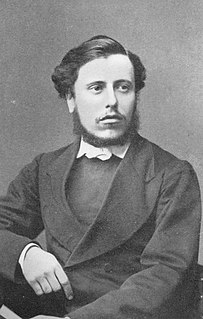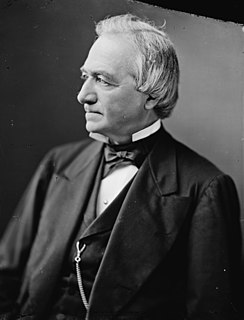A Quote by Henry David Thoreau
A man cannot wheedle nor overawe his Genius. It requires to be conciliated by nobler conduct than the world demands or can appreciate.
Related Quotes
A man cannot free himself by any self-denying ordinances, neither by water nor potatoes, nor by violent possibilities, by refusing to swear, refusing to pay taxes, by going to jail, or by taking another man's crops or squatting on his land. By none of these ways can he free himself; no, nor by paying his debts with money; only by obedience to his own genius.
His hypothesis goes to this - to make the common run of his readers fancy they can do all that can be done by genius, and to make the man of genius believe he can only do what is to be done by mechanical rules and systematic industry. This is not a very feasible scheme; nor is Sir Joshua sufficiently clear and explicit in his reasoning in support of it.
When the sacredness of one's word is matched in the attributes of his character throughout, all that constitutes a man, then we find that there is something in a man's life greater than his occupation or his achievements; grander than acquisition or wealth; higher than genius; more enduring than fame.
The nobler sort of man emphasizes the good qualities in others, and does not accentuate the bad. The inferior does the reverse. . . . The nobler sort of man pays special attention to nine points. He is anxious to see clearly, to hear distinctly, to be kindly in his looks, respectful in his demeanor, conscientious in his speech, earnest in his affairs. When in doubt, he is careful to inquire; when in anger, he thinks of the consequences; when offered an opportunity for gain, he thinks only of his duty.
The book, the college, the school of art, the institution of any kind, stop with some past utterance of genius. . . . They look backward and not forward. But genius looks forward: the eyes of man are set in his forehead, not in his hindhead: man hopes: genius creates. Whatever talents may be, if the man create not, the pure efflux of the Deity is not his; - cinders and smoke there may be, but not yet flame.
Nothing is so much coveted by a young man as the reputation of being a genius; and many seem to feel that the want of patience for laborious application and deep research is such a mark of genius as cannot be mistaken: while a real genius, like Sir Isaac Newton, with great modesty says, that the great and only difference between his mind and the minds of others consisted solely in his having more patience.
Dear God, I prayed, all unafraid (as we're inclined to do), I do not need a handsome man but let him be like You; I do not need one big and strong nor yet so very tall, nor need he be some genius, or wealthy, Lord, at all; but let his head be high, dear God, and let his eye be clear, his shoulders straight, whate'er his state, whate'er his earthly sphere; and let his face have character, a ruggedness if soul, and let his whole life show, dear God, a singleness of goal; then when he comes (as he will come) with quiet eyes aglow, I'll understand that he's the man I prayed for long ago.
The best minds come from the most unexpected faces and places. There is no image for intelligence or genius. Genius is something that cannot be seen. It cannot be produced or manufactured. It is something that even the true genius thinks is unattainable. The genius recognizes he’s just a small pea in a sea of infinite atoms. Knowledge is as infinite as the universe. The man who claims to know all, only reveals to all that he really knows nothing.

































